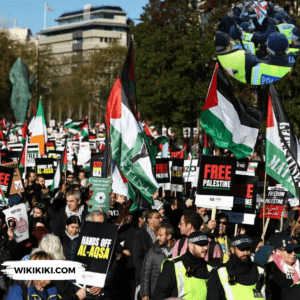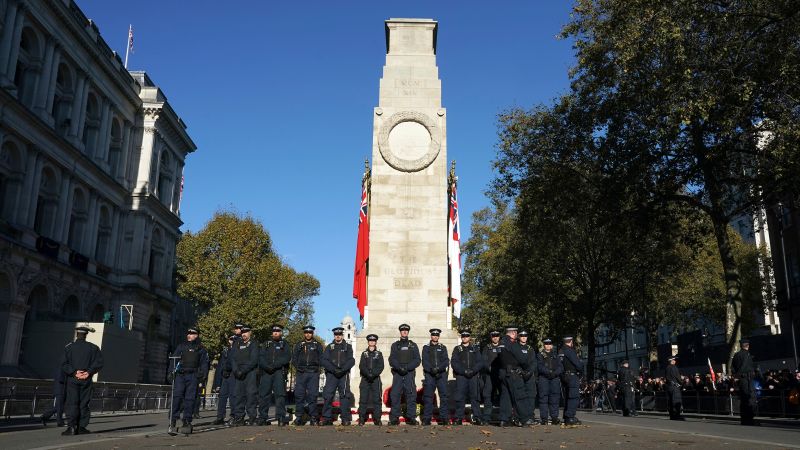The events in London, particularly the clashes between far-right protesters and the pro-Palestinian march, have a wave of discussions and debates. The Metropolitan Police’s condemnation of “extreme violence from right-wing protesters” and the arrests have complex dynamics surrounding the protests.

Also Read: Sudan: More than 25 Million People Need Humanitarian Help
The Metropolitan Police has condemned the “extreme violence” by far-right protesters who sought to confront a pro-Palestinian march.
Nine officers were injured, and 126 people were arrested, with the majority being counter-protesters. The clashes, characterized by aggression, intoxication, and confrontational behavior, raised worries about public safety.
The far-right protesters, identified as football hooligans from across the UK, claimed to be protecting monuments but faced accusations of disrespecting the Cenotaph war memorial.
The incidents involved offensive chants, abuse directed at officers, and the discovery of weapons and drugs among the counter-protesters.
While the pro-Palestinian march itself did not witness physical violence, the police reported offenses related to antisemitic hate crimes.
Instances of antisemitic chanting, displays of hateful symbols, and the investigation of support for proscribed organizations.
Home Secretary Suella Braverman‘s characterization of pro-Palestinian protests as “hate marches” and her accusations of police bias controversy in the lead-up to the events.
Also Read: Saudi Arabia Hosts Emergency Summits to Address Gaza Crisis
The Home Secretary’s comments, published in The Times, drew criticism from various quarters, including London Mayor Sadiq Khan and Labour leader Keir Starmer. Calls for Braverman’s resignation intensified, with accusations of tensions and undermining the police.
Defence Secretary Grant Shapps defended Braverman’s engagement in the debate about policing the march, highlighting the need for open discourse.
However, the accusations of bias and the impact on community relations remained central to the political discourse.
The pro-Palestinian march, organized by the Palestine Solidarity Campaign, drew attention as one of the largest gatherings in the UK since the conflict between Israel and Hamas began.
Approximately 300,000 people, according to police estimates, marched through central London, calling for a Gaza ceasefire.
The scale of the demonstration added political pressure on leaders, including Prime Minister Rishi Sunak and Labour leader Keir Starmer, to address the ongoing conflict in the Middle East.
The march, coinciding with Armistice Day, aimed to amplify voices advocating for a ceasefire and drew attention to the humanitarian crisis in Gaza.
Chants of “free Palestine” and “ceasefire now” reverberated through the streets as protesters expressed their concerns about the impact of the conflict on civilians, especially children.
Also Read: Chen Shaojie: CEO of Chinese Live-Streaming Platform DouYu Goes Missing
Assistant Commissioner Matt Twist acknowledged the challenges faced by law enforcement amid the complex circumstances of the day.
The debate on protest and policing, combined with existing community tensions, contributed to the difficulties in maintaining public order.
The use of a number of officers and resources, including thousands of cameras and a police helicopter, reflected the scale of the operation.
Law enforcement’s efforts to prevent clashes between pro-Palestinian marchers and far-right counter-protesters involved the declaration of exclusion zones and security measures around key locations.
Despite these measures, the confrontations in Whitehall, Chinatown, and other areas underscored the challenges in managing public demonstrations with opposing viewpoints.
The media played a role in shaping public perception of the events. Social media platforms sharing of footage, images, and firsthand accounts, providing real-time updates on the situation.
The presence of high-profile figures, including former EDL leader Tommy Robinson and Levelling Up Secretary Michael Gove, added to the media scrutiny.
Images of clashes, chants, and the overall atmosphere of the protests garnered widespread attention, contributing to the ongoing debate about the appropriateness of scheduling the pro-Palestinian march on Armistice Day.
Also Read: Ohio Election: Voters Approve Abortion Protections

/cloudfront-us-east-2.images.arcpublishing.com/reuters/2S2VNVOWAFPH7CTZK5I3BLZX3Q.jpg)





















